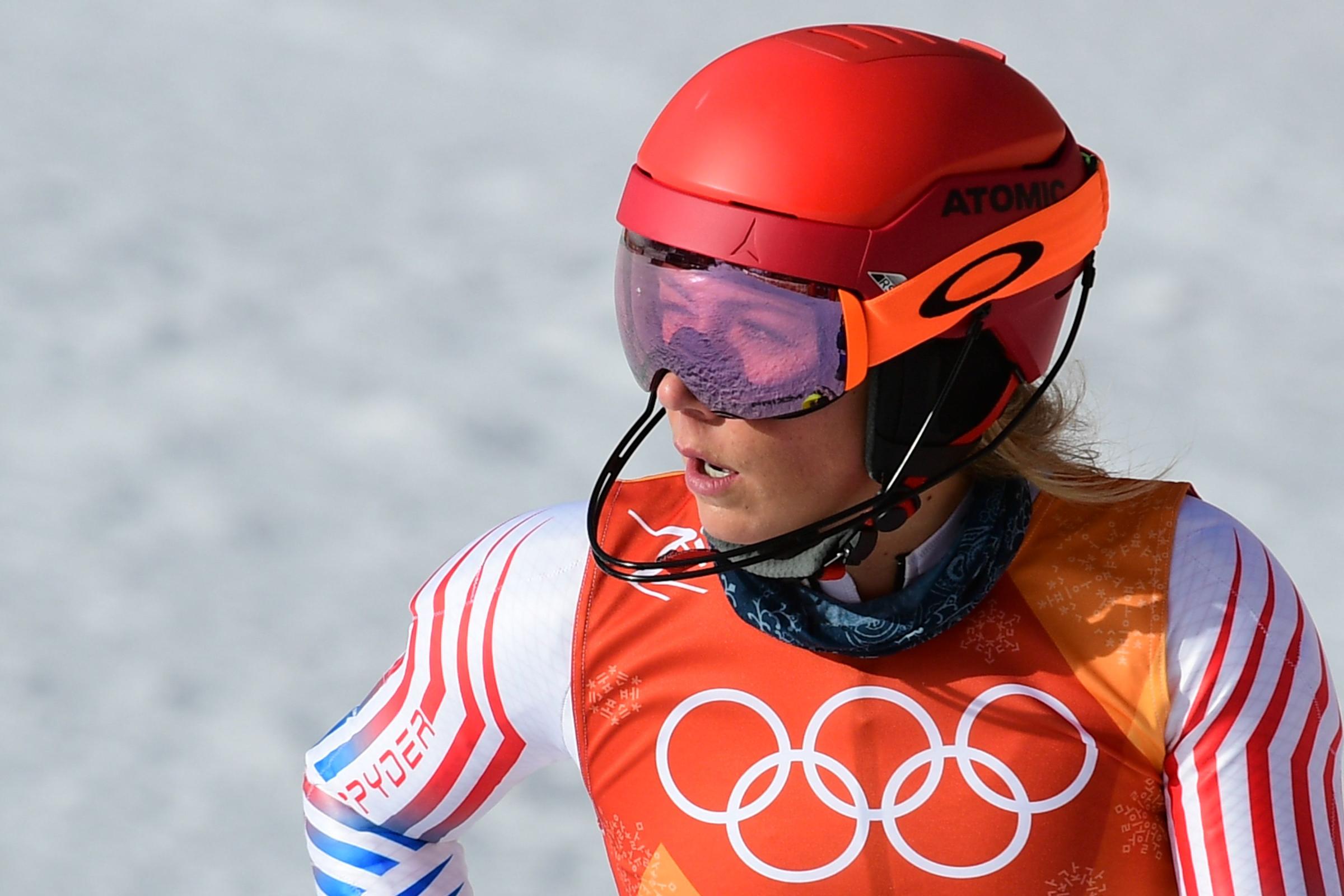Soon before the start of her first slalom run at the 2018 Winter Olympics Games on Friday, a horrible feeling overcame American skiing star Mikaela Shiffrin. She wondered if she had food poisoning. “What is happening?” Shiffrin, who won five straight slalom races to start the calendar year, thought to herself. Overcome by nerves, she threw up.
Her performance left her feeling lousy. She finished the first run in fourth, down by nearly half a second; despite an admirable second run effort in which she started gaining speed before fading, she stayed in fourth place. Shiffrin missed the podium in her most dominant race.
In the mountains of PyeongChang on Friday, Americans felt the pain of fourth place, arguably the least desirable spot in which to finish at an Olympics. While Shiffrin was whiffing on her podium, Lindsey Jacobellis — the snowboard crosser who was infamously cruising to a gold medal in Torino, before hot-dogging it at the end and falling before recovering in time to win silver — made her first Olympic finals since those 2006 Games. But she finished fourth, missing a medal by .03 seconds.
Whose sting was sharper? Few Olympic athletes have felt more pain at the Games than Jacobellis. At every Olympics since Torino, her pursuit of the gold she let slip thorough her fingers becomes an irresistible storyline. She got bumped in the semis in both Vancouver and Sochi. Though she was just 20 at the time of her Torino tumble, the media criticized Jacobellis for doing a stylish trick on her snowboard rather than clinching the sure thing. Her blunder — in truth, one of the worst in Olympic history — has trailed her for years.
She resists talking about the mistake, and insists she’s over it. But despite her sustained success in snowboard cross, most casual sports fans who recognize her name know her as an athlete who choked at the Olympics.
And unlike Shiffrin, Jacobellis can’t go back out to race in a few days. Snowboard cross is a one-shot deal at the Olympics. If, at 32, Jacobellis wants to keep competing, she’ll have to wait four more years for a fifth attempt at gold.
Shiffrin’s subpar day, however, also carries consequences. She’s shooting to break records at these Games; a gold in slalom would have made her the first American skier to win three career Olympic golds. The giant slalom gold medal Shiffrin won on Thursday in PyeongChang came at a cost: it left her tired and anxious for her strongest event, the slalom, the following day. Shiffrin was required to attend the medals ceremony following her giant slalom victory. (Nice problem to have, to be sure). The victory march kept her up past her usual 8:30 p.m. bedtime; she hit the sack around 10:00. Shiffrin has always put great stock in shut-eye, and is known as a serial napper, regularly catching quick sleeps in ski lodges and chair lifts. At a high school ski meet, she once feel asleep near the start, a book she was reading for class perched atop her face.

Shiffrin was never supposed to race on back-to-back days at the 2018 Winter games. Weather delays, however, forced PyeongChang Olympics organizers to compress the alpine skiing schedule. A year ago, the nerves she battled before the slalom in South Korea almost derailed her season. She fretted about things she couldn’t control, like weather postponements of training sessions and questions from the media about rising expectations. Her habit of throwing up before races got so bad, she started talking to a professional. During her first Skype session with the psychologist, Shiffrin started gagging when she described the problem.
She eventually stopped vomiting, and won the first World Cup title of her career. So her nerves returned at the most inopportune time. Between the two runs, Shiffrin’s mother and coach, Eileen, asked her how she could help her daughter. Mikaela didn’t really know what to say. “Yesterday, it was such an emotional high,” says Shiffrin of her giant slalom win. “It felt like such a victory on so many levels, that it was difficult to keep my mental energy consistent. It was tough to carry that energy into today. I didn’t really feel like myself on my skis this morning. It’s definitely a bummer.”
She needs to shake off the disappointment in time for her next event, which could either be the downhill on Wednesday, or if she chooses to skip that race, the combined event (slalom and downhill) on Friday. “Moving forward? I am terrible at that,” Shiffrin says. “No, every single loss that I’ve ever had, I remember that feeling so — oohh — so thoroughly. It’s like a piece of my heart breaks off and I can never get it back. And yeah, today is no different than that. Someday I’ll be able to understand that it’s part of life and I’m just learning and I’m 22-years-old.”
Shiffrin needs to learn fast. Or another dreaded fourth place may await.
More Must-Reads From TIME
- The 100 Most Influential People of 2024
- The Revolution of Yulia Navalnaya
- 6 Compliments That Land Every Time
- What's the Deal With the Bitcoin Halving?
- If You're Dating Right Now , You're Brave: Column
- The AI That Could Heal a Divided Internet
- Fallout Is a Brilliant Model for the Future of Video Game Adaptations
- Want Weekly Recs on What to Watch, Read, and More? Sign Up for Worth Your Time
Write to Sean Gregory / PyeongChang at sean.gregory@time.com